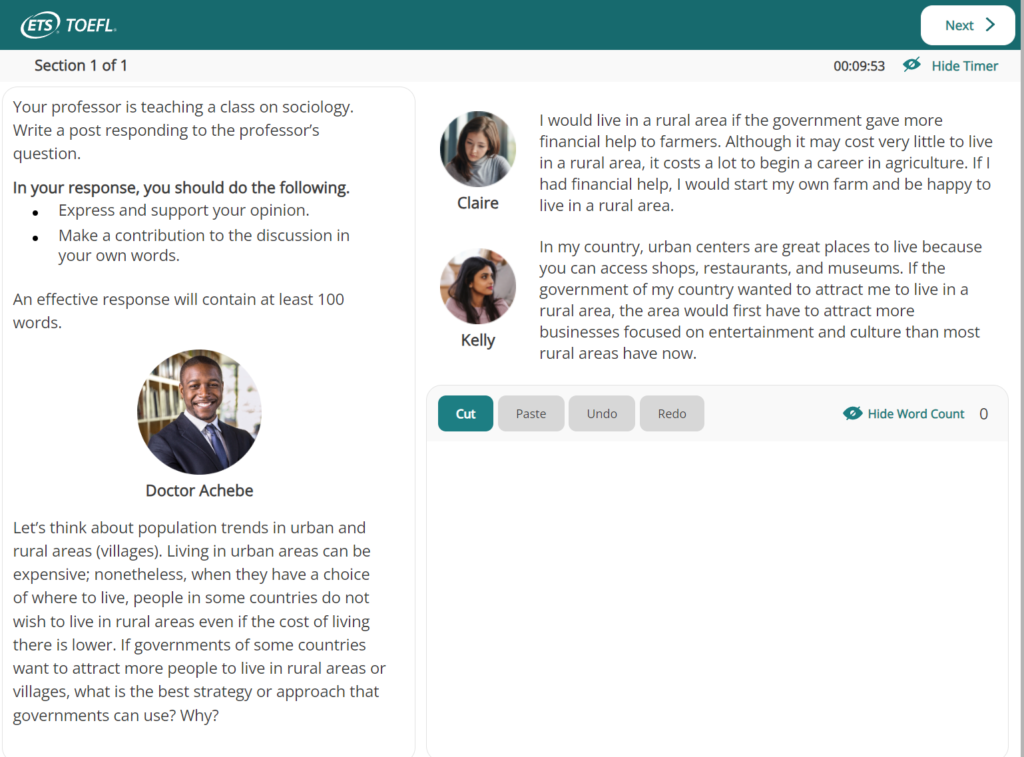Enhance TOEFL integrated writing prowess by mastering note-taking techniques and grasping article structures. Learn to extract vital details from listening and recognize logical frameworks. Elevate your skills for a successful essay that seamlessly combines reading and listening materials. Your path to excellence starts here.
Table of contents

Why You shoud learn how to take notes effectively
Learning how to take effective notes for the TOEFL integrated writing section offers numerous advantages for test-takers. This skill goes beyond the exam, contributing to better academic and communication abilities.
Here’s why mastering note-taking is essential:
- Enhanced Comprehension and Retention Taking structured notes helps you comprehend the main ideas, supporting details, and relationships between concepts presented in the listening and reading materials. This not only improves your understanding during the test but also aids in retaining information for future use.
- Clear Organization of Ideas Structured notes provide a clear roadmap for your essay. When you organize the content you’ve captured, your essay’s logic and flow become more coherent and organized. This organization makes it easier for the reader to follow your arguments.
- Efficient Review and Revision Well-organized notes make it simpler to review your material before you start writing. This saves valuable time and ensures you don’t overlook any key points. Additionally, during the writing process, referring back to your notes helps you stay on track and maintain the consistency of your arguments.
- Precise Writing Your notes serve as a concise reference, ensuring you stay true to the original content from the listening and reading materials. This prevents unintentional misinterpretations or deviations from the intended message.
- Improved Critical Thinking Taking notes forces you to identify the most relevant and significant information from the listening and reading sources. This practice hones your ability to distinguish essential points from less important ones, thereby enhancing your critical thinking skills.
- Lifelong Skill Effective note-taking isn’t just for TOEFL; it’s a skill that serves you well in various academic and professional settings. Mastering this skill now equips you with a valuable tool for success in higher education and beyond.
- Better Communication Learning to condense complex information into concise notes also helps you communicate more effectively in daily life. You’ll find yourself better able to summarize conversations, meetings, and lectures, which is a valuable skill in many contexts.
- Confidence Boost Being well-prepared with organized notes instills confidence during the test. It allows you to approach the writing task with a clear plan and understanding of the content, reducing anxiety and enhancing your performance.
Key Points and Logical Structure
When preparing for the TOEFL integrated writing section, mastering key points and understanding the logical structure of an article are essential skills. Key points are relatively straightforward, but grasping the concept of logical structure might be more abstract.
Setp of gripping points
- Identifying Logical Words and Transitions Keep an ear out for logical and transitional words that indicate the article’s structure, such as “first,” “second,” “third,” “what’s more,” “and then,” “another,” and so on.
- Understanding Article Structure from Listening Listen carefully to grasp the organization of information in the article. Is the article structured around categories with examples, explaining a process, or comparing and contrasting? Make sure to take detailed listening notes.
- If the article uses a category-with-examples structure, focus on noting the basis of categorization, the names of each category, and the examples provided in each category.
- If the article explains a process, pay attention to words that signify stages and note the progression of events and key features for each stage.
- If the article involves comparison or contrast, jot down the points of similarity and difference between the discussed elements.
Note-Taking Guidelines for TOEFL Integrated Writing
- Organize with Frameworks Before you start listening, prepare a structured framework for your notes. This helps maintain clarity in your note-taking process.
- Language Choice You can take notes in English, your native language, or a mix of both. Focus on unfamiliar words, especially those related to the topic. Even if you’re unsure of their exact meaning, recognizing their pronunciation aids when they appear in the listening section.
- Capture Essential Vocabulary Pay special attention to conceptual academic words, proper nouns (names of people and places), and specific terms. You might not understand their precise meanings, but they can be crucial details in the listening section. Even if you guess based on pronunciation, record the entire word.
- Comprehensive Note-Taking Always take notes; understanding is not enough to forego note-taking. Integrated writing isn’t just about answering multiple-choice questions; it relies heavily on details. Even if you have a good memory, after writing a 10-minute essay, you might forget critical details.
The Role of Effective Note-Taking in TOEFL Integrated Writing
The integrated writing section of the TOEFL usually doesn’t involve going off-topic. The focus is on your ability to synthesize information from reading and listening materials rather than expressing personal opinions. Hence, your reading, listening, and note-taking skills are paramount for this task.
Why are notes crucial in integrated writing?
Why are notes crucial in integrated writing? If you can’t remember the key points from the listening, you won’t know what to write about. Some students attempt to jot down every word during the listening, only to find they’ve retained nothing. This leads to confusion when writing the essay.
Conclusion
When taking notes for TOEFL integrated writing, remember to be concise. List the key points and briefly elaborate on reasons if necessary. You can use keywords or shorthand symbols you’ve practiced with. However, avoid attempting to write while not understanding; notes taken then might be incomprehensible later and could even lead to inconsistencies between your writing and the listening material.
Leave a Reply